
If you don’t want to read a long article then here’s the short version of my analysis of Google’s latest in a series of failed social networking services: Like China, Google is building a state-of-the-art super-city in the middle of nowhere, where nobody cares to live, irrespective of whether anyone actually wants to — or is — living there.
It feels to me like a very rich, very opinionated Google has decided what the right way to do social media is and they’re going to implement this utopian vision whether or not anyone else is interested in joining — or attending — their Church of Plus.
Ceci N’Est Pas les Médias Sociaux
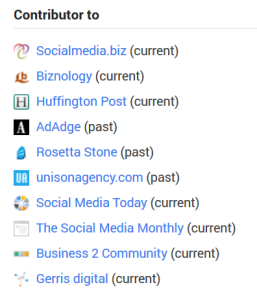
Up until Google search started cleaning up Search Dodge of all of the spam, the shysters, the fraudster, the Black Hats, all you needed were mad linking and backlinking skills. It wasn’t hard to dupe Google into putting you or you clients onto the first page of Google if you had enough money, resources, time, and a flexible enough morality. This isn’t about a social network in the same way that research on mice isn’t about the mazes.
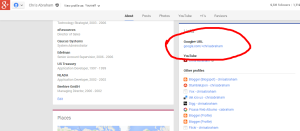
In the past, it wasn’t hard to just create a Gmail, Yahoo, Me, Hotmail account and sign up for YouTube, retaining certain level of anonymity. Same thing with Blogger and blogs, social networks, Tumblr, and just about everywhere else online, including the Googlesphere.
Now, as Google closes in on all of us, this will probably be really good for those of us who are makers, creators, original artists, original writers. As Google is able to tell who we are, where we write, Google will better understand where ground zero is and which copies of all of our work, our words, our images, and our art are copies, replicants, replicas, echoes used possibly without prior approval and exclusively for bandit content remarketing as a way of ginning and gaming SEO.
Is G Google’s Ellis Island?

Is Google+ actually a place that has been trying to take the virtual tired, poor, and huddled masses, wretched refuse, the homeless, tempest-tossed, and sort them out to see which are the earnest writers, makers, producers, content-creators, tweeters, bloggers, journalists, authorities, academics, students, experts, curious, influential, and which are the Asian link farms, the copy-and-paster, the plagerist, the conman, the SEO grey and blackhat?
Is this a way to try to offer some forgiveness to those newbies and fools who don’t actually know they’re doing dastardly things? Who don’t understand things like on-site duplicate content or how best to optimize for title, description, or copy? To see whether people in this immigrant line are sweating, are ornery, look shifty, or have a history of doing really dodgy thing. And this explains why there’s no advertising on Google+: this isn’t a place where consumers are want to hang out. Google+ is a place for the makers and creators to come, where they can feel safe, where they can brag and promote and post and see everything rendered beautifully.
Google+ is a staging area for all the poets, writers, advertisers, marketers, copywriters, screenwriters, playwrights, webwrights, publicists, designers, artists, critics, authors, columnists, bloggers, coders, painters, photographers, and architects get to spend their time while Google gets to know you while they’re sorting out which ones of us will bubble to the top of Google and which ones will be removed completely from Google’s index full stop.
Google ’s Influence on Search is Always Changing

So, while I will still be associated with search results whenever they’re my work, my face will no longer draw your eye. That said, it hasn’t rolled out everywhere because, as you can see, my mug still comes up when you search for my articles on when I show up on Google News through Business 2 Community, for example.

But Search Engine Land is probably right. The reason is probably because the illustration probably takes the eye too powerfully away from paid contextual advertising, which is antithetical to Google’s desire to make lots and lots of money from Google Adwords and Adsense ads. Even Google understands not to bite the hand that feeds them. Advertising dollars underwrite everything else, including self-driving cars.
The Church of Google
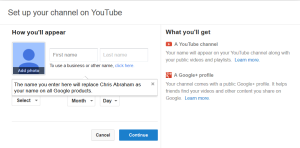
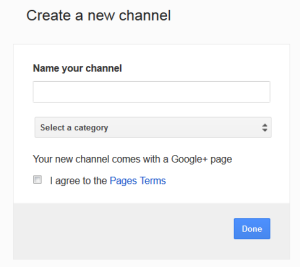
Sort of like, if you tell a prospective employee or vendor that you’d be happy to hire or do business with them if they’ll marry your unmarriageable son or daughter. I mean, it might be worth it if your entire business depends on it (which is the case when it comes to some companies who make their entire living based on whether they’re at the top of Google organic searches or if you’re suffering an online reputation crisis and getting to the top of Google search literally pushed negative or untrue content down).

That said, 99.999% of the 540 million members of Google don’t own online — or any — business they need to promote, don’t have an online reputation worth noting — or don’t notice or care much about that sort of thing, or have any intention of creating content for YouTube, commenting on YouTube, or even tracking calendars, writing documents, storing files, sharing images, or anything else outside of email. In this case, Gmail.
The only reason why Facebook is so popular is because everyone — everybody — you have every know is there, especially your kids, friends, classmates, and family are there.
No, it’s not because of Facebook Business Pages or because their favorite brands or celebrities are there — that’s where Twitter shines — but because that’s where the baby pictures are. Hell, Pinterest and Tumblr do a much better job than Google+ when it comes to this, and that’s not even their core competencies.
The Denizens of Google

Three years ago, I had a lot of engagement on Plus; however, of the 5k+ people I have in my circles, I almost never get a +1 or a comment or anything — even when I am dropping bombs, being bombastic, or baiting on guns, gun control, the second amendment. While I may well have been frozen out of the cool kids clique on Google+, I don’t think so as I feel like my friends are singling olly olly oxenfree as well, in an attempt to see if they’re posting into the void.
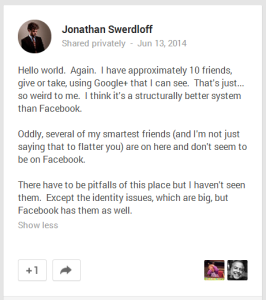
“Again. I have approximately 10 friends, give or take, using Google+ that I can see. That’s just… so weird to me. I think it’s a structurally better system than Facebook Oddly, several of my smartest friends (and I’m not just saying that to flatter you) are on here and don’t seem to be on Facebook. There have to be pitfalls of this place but I haven’t seen them. Except the identity issues, which are big, but Facebook has them as well.”
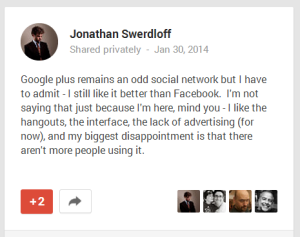
Google Clone Wars
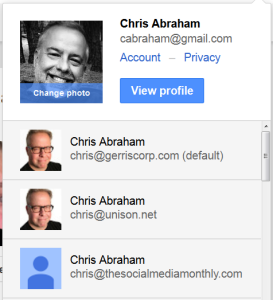
They all have potential Google+ profiles associated with each of them. There’s no way, currently, to hook all of my Business Apps personal profiles to my G+ HQ — so, unless I am constantly vigilant, I have all of these clones running around, clones that not only look like me but sort of are me, but not really. They’re not impersonators, they’re authentic clones. But I neither want nor need them.
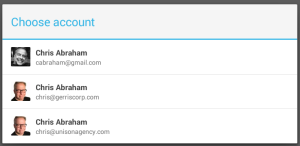
Sharing to Google Plus Sucks
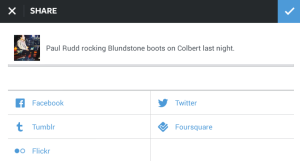
At the end of the day, I might post a synopsis of the day, rolling all the day’s photos into one album, gallery, or post, and that’s only because I have my G+ app set up to auto-backup all the photos from my Google Android Nexus 5 and Apple iPhone 5 to Google, which is build in on both apps. But even then, not every time and always in time delay, hours and hours after I had the experience. As an afterthought.
When I talk to Google folks or Google+ fanboys, they always say that that’s to avoid spam. Well, who spams with Instagram? Who spams from mobile phones? And, if it’s to defeat spam, it’s kind of control-freaky: do it my way, by using the G+ plus app each time, or don’t do it at all. I won’t do it at all. Plus, even if I did use the G+ app to do my photo blogging, there’s no way for me to concurrently cross post from G+ to Twitter, Facebook, Pinterest, Foursquare, Tumblr, and Flickr either. It seems like Google is saying, my way or the highway. Well, Google, see ya!
The folks at Google must really be a bunch of control freaks. Google hates off-label use of its software. Google hates it when we play with the box and not the toy we were given. They not only melt down about it but have bonafide temper tantrums. It hasn’t always been this way. Google used to generously offer all of its services as APIs, it used to follow open standards. and it used to be a leader in share and share alike. No more. Google’s been hurt before. Innovation is disruption and disruption opens the door for abuse.
Plus, there’s some hypocrisy there: you can spam to Google+ all you want if you’re a client of professional content marketing tools like Buffer, GaggleAMP, and HooteSuite. If the only reason why Google+ doesn’t allow me to crosspost to Plus is to decrease clutter and increase engagement, you would think that Google would only enable cross posting from mobile devices and not from professional marketing platforms. Isn’t it ironic, don’t you think.
What I think it that Google is heavy handing the adoption of the G+ mobile app and web app as “homeroom” for social media and multimedia sharing — and it’s just not working at all. Not at all. PS: Dear Google: the serious denizens of the Internet and the early adopters tend to be pretty Libertarian and don’t respond well to heavy-handedness or hegemonic coercion.
Google Plus’ Robot Zombie Army
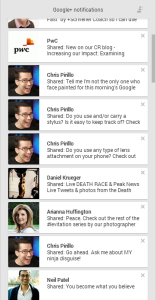
Maybe I have a stilted filter because I am a shameless content marketer — maybe I am not posting enough heartfelt, revealing, and compelling content (and I really can’t because it’s so tough to post to G+, as I said before), but it seems like posting to Google+ is pretty much an automated afterthought, something I too recommend to my clients, “hey, be sure to have a G+ Page,” I advise, “but just cross post the stuff you prepare for Facebook, it’ll work. I can hook you up with ways of easily cross-posting using HootSuite, GaggleAMP, and the Buffer app — no worries.” But all I see when I go in is 80% posts from Chris Pirillo, 10% from Madonna, and the rest from various and sundry people who are probably including Google+ as part of their SEO routine.
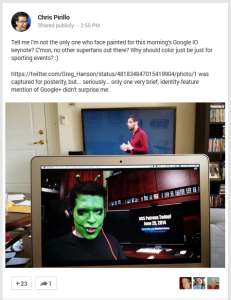
If the only people who tithe to G+ are only there to pay for their sins — if there are no passionate players, actors, choir, the evangelical — then there will never be much engagement and the general tone of Google+ will be all talk — blah, blah, blah, blah — and no listening, engagement, or sharing (which, of course, are the most essential parts of social media anyway, and the things that Google+ gives lip service to as being essential for the future of Google’s search engine algoritym.
Google for Google Juice
The only people who care about links, keywords, backlinks, page rank, relevence, or Google juice are marketers and people who have things to promote. Most people have nothing to do with entrepreneurship, startups, small business, affiliate marketing, brand promotion, selling, sales, or online reputation. Most folks have jobs or are in school. Most people are employees and not employers. The juiciest of content is not the content shared by people with an external or commercial agenda, it’s between people who love with each other or are passionately in love with some third thing, such as a hobby, parenting, a club, school, profession, life experience, etc. There are a number of types of communities including community of action, community of circumstance, community of inquiry, community of interest, community of place, community of position, community of practice, and community of purpose; however, there’s no such thing as a community of shameless self promotion. There can be advertising, promotion, sponsorship, underwriting, and marketing, but only on top of a vigorous, deep, persistent and durable community.
Real communities realize that in order for the bills to be paid and to remain a viable community, one needs to pay dues, run bake sales and hold raffles. Clubs never form because they get to pay dues, sell ads, run bake sales or hold raffles. I fear that maybe Google+ does things backwards: it made G+ too compelling to the sort of people who only talk and never listen, only take and never give. There might very well be some very special, intense, and smart little eddies of engaging and engaged communities.
I know my favorite podcast, No Agenda, has a number of self-organizing Google+ Communities that are thriving around the production of the No Agenda show, but that’s pretty much because Adam Curry hates Facebook and John C. Dvorak quit Facebook — Google+ is the only place they’re willing to be, so their producers and listeners have followed them. Other than that, many of the communities seem to have a lot of people as members, around 24k each, but I really have never been recommended them, invited to join any of them, so who are these people? I really don’t know. Maybe I have been excommunicated or exiled from the cool kids on G+.
In Conclusion
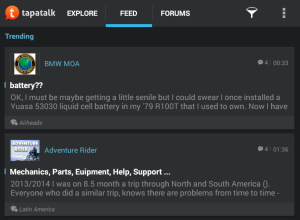
It’s more Dungeons and Dragons than going on dates and it suffers from a staunch desire not to open up its doors for fear of ruining it. Ruining it? Oh Google, how can you brag 540 million active G+ members and not want any of them to use it for fear of ruining it. You’re a member of a club that has such a small member ship that it very well might be elite and exclusive — but it’s not because Google+ is just the open admissions school that nobody actually wants to go to.

Right now, it’s dead last, even behind the Adventure Riders, Motobrick, and BMW MOA forums. And even behind Pinterest, a social sharing platform that I don’t understand or get but need to check religiously because my awesome girlfriend sends me pins that really make me happy, so I spend more time on Pinterest than even you, Google+. You may well be a beauty but the fact that we don’t like you is not because we’re haters or because we’re just jealous, it’s because you’re dull, uninteresting, and all you talk about is work.
Let me know what your experience is with Google+, YouTube, or any of the corporate or local pages. How are you experiencing Google, circa 2014?
And, don’t forget: go git ‘em, Tiger!

